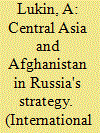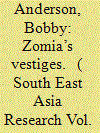|
|
|
Sort Order |
|
|
|
Items / Page
|
|
|
|
|
|
|
| Srl | Item |
| 1 |
ID:
107852


|
|
|
| 2 |
ID:
129447


|
|
|
|
|
| Publication |
2013.
|
| Summary/Abstract |
Notwithstanding the role that opium and narcotics have played in China's history, drug use, trafficking and other drug-related problems have been consistently condemned by the Chinese government as social vices. After being a 'drug-free' nation from the 1950s to the 1970s, drug problems resurfaced in the 1980s and China was forced to deal with such problems once again. The Chinese government is well known for its tight control over the media, and for its ability to utilize propaganda to win public support and carry out its policies. However, the Chinese government's use of the media and propaganda to deal with drug issues has never been explored. Based on longitudinal data collected from the People's Daily (from 1946 to 2009), this study examines two key issues: the ways in which the government has utilized ideology in its official stories over time, and the means through which the government has tried to re-establish its drug control in the 21st century. The data suggest that the use of 'hard-core' ideology as a tool has not only drastically declined over time but also undergone significant modifications. The Chinese government has adopted a multifaceted approach to drug control and it has managed to present a unified voice in the media in combatting drug problems.
|
|
|
|
|
|
|
|
|
|
|
|
|
|
|
|
| 3 |
ID:
183948


|
|
|
|
|
| Summary/Abstract |
Neoliberalism—a varied set of economic ideologies and policies that came to prominence in the late twentieth century—was closely linked to the global expansion of the national security state, a relationship best illustrated by U.S. drug control programs in Latin America during the 1980s and 1990s. A brief look at the history of U.S. drug control in the region demonstrates how neoliberalism entailed a reconfiguration, rather than a withdrawal, of the state’s authorities and capabilities. This essay explores the intersection of neoliberalism and drug control in U.S. foreign relations with Latin America through an example from Bolivia, tracing the mechanisms U.S. diplomats, policymakers, and politicians used to secure U.S. influence over foreign drug control and economic policies while revealing the contradictions of pursuing a militarized drug control approach within the context of a neoliberal economic program.
|
|
|
|
|
|
|
|
|
|
|
|
|
|
|
|
| 4 |
ID:
104434


|
|
|
| 5 |
ID:
156345


|
|
|
|
|
| Summary/Abstract |
Extending the literature on environmental and diplomatic history, this article examines how herbicide use in U.S. drug control during the 1970s sheds light on the U.S. domestic politics of toxic chemicals, consumer protection, and the limits of U.S. environmental law in American foreign policy.
|
|
|
|
|
|
|
|
|
|
|
|
|
|
|
|
| 6 |
ID:
158204


|
|
|
|
|
| Summary/Abstract |
Opium poppy cultivation in Thailand fell from 12,112 hectares in 1961 to 281 hectares in 2015. One outlier exists: Chiang Mai Province’s remote southwestern district, Omkoi. Ninety percent of the district is a national forest reserve where human habitation is illegal. However, an ethnic Karen population has lived there since long before the law that outlawed them was created, unconnected to the state by road, with limited or no access to health, education and other services. Omkoi’s Karen increasingly rely on cash-based markets. Their lack of citizenship precludes them from land tenure that might incentivize them to grow alternative crops, and their statelessness precludes them from services and protections. Nor is the Thai state the singular Leviathan that states are often assumed to be; it is a collection of agencies and networks with divergent interests, of whom one of the most powerful, the Royal Forestry Department, has purposely made Omkoi’s population illegible, and has consistently blocked the attempts of other state actors to complexify Omkoi beyond the simplicity of its forest environment. These factors make the state illegitimate to Omkoi’s Karen just as Omkoi’s Karen are illegitimate to the state, and make the cultivation of short-term, high-yield, high-value, imperishable opium a logical economic choice for poor Karen farmers, especially given the historical lack of law enforcement presence. However, that presence is growing, as Omkoi becomes one of the last areas of Thailand to experience the historical extension of lowland Padi state power into an ungoverned, untallied highland.
|
|
|
|
|
|
|
|
|
|
|
|
|
|
|
|
|
|
|
|
|